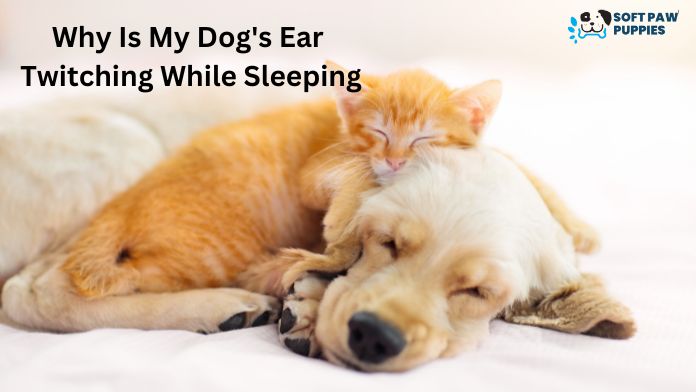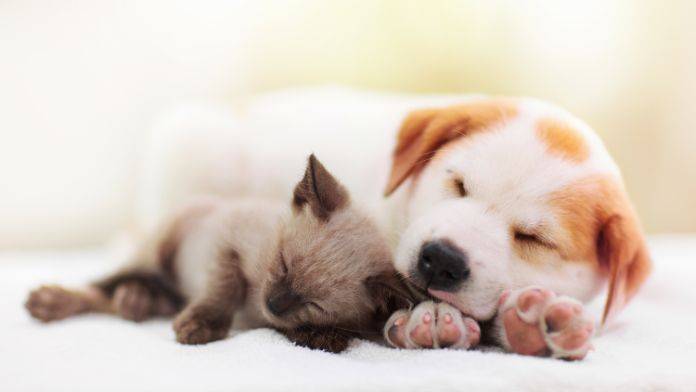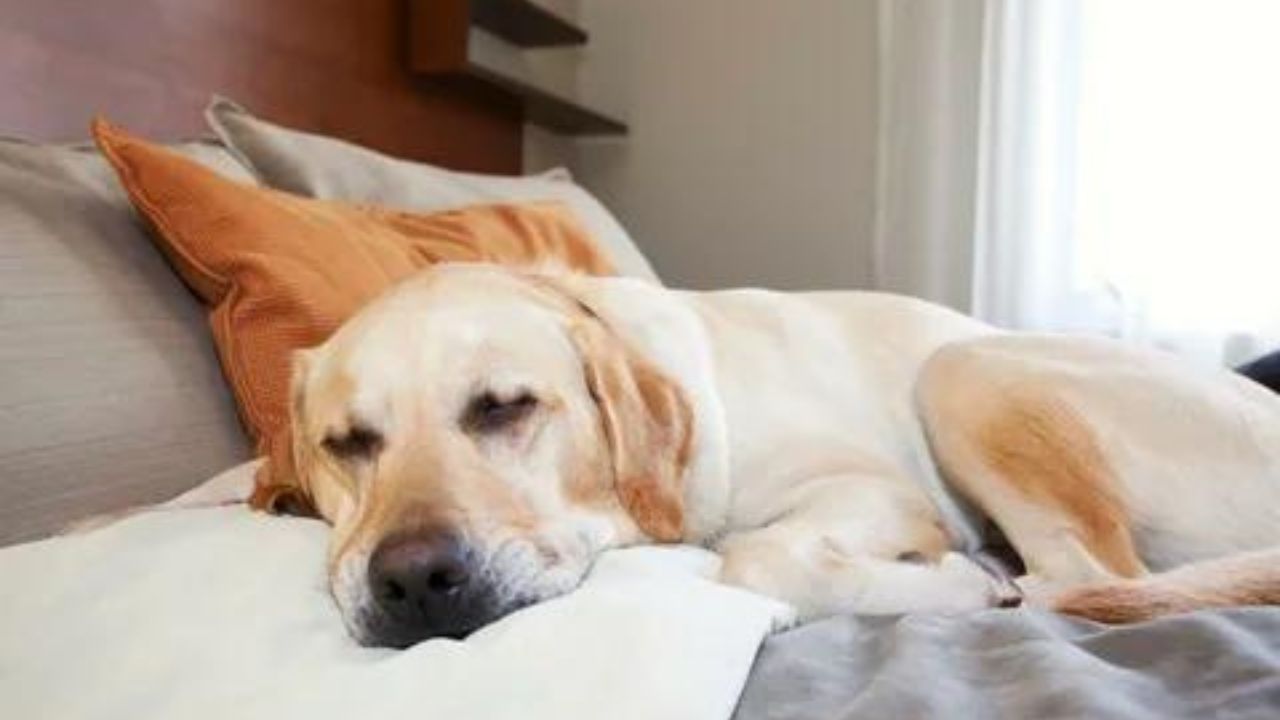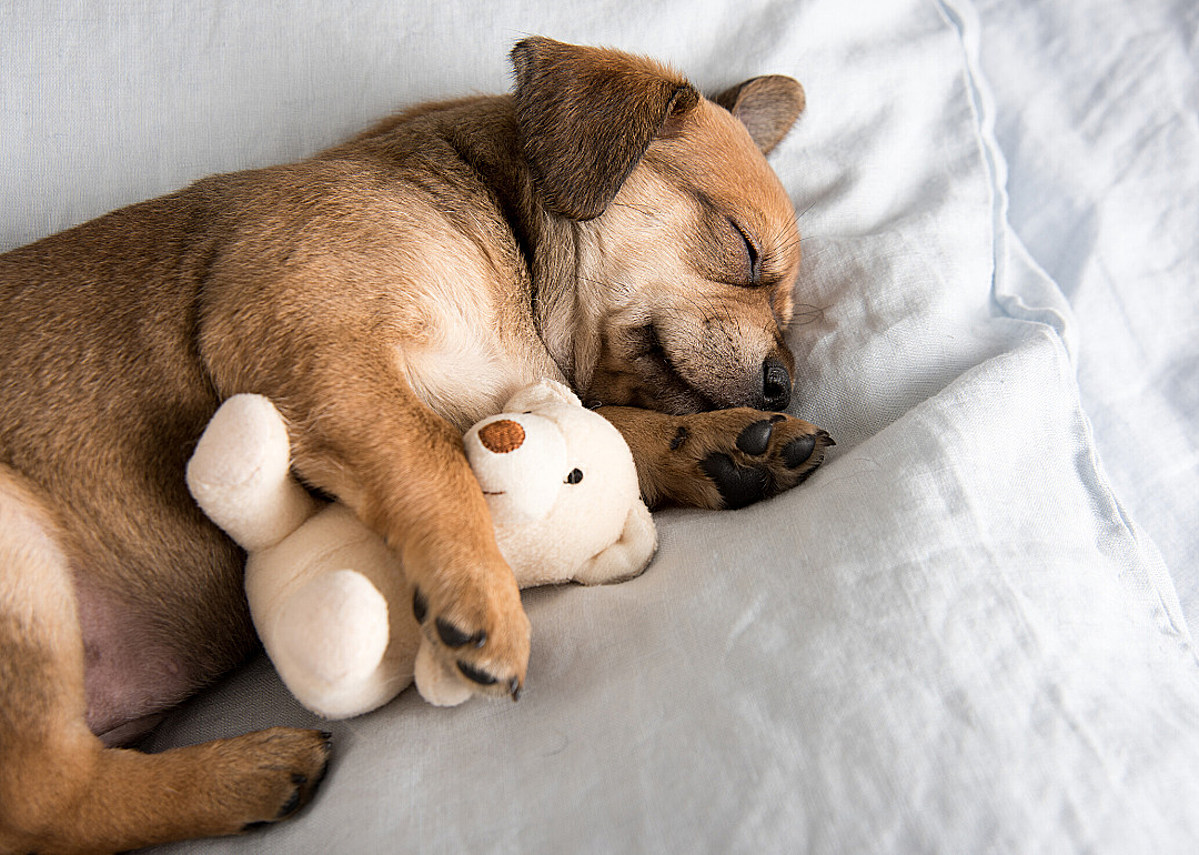
Dogs are known for their quirky behaviors and adorable quirks, which often leave us wondering about the reasons behind their actions. One puzzling behavior is when your dog’s ear twitches while sound asleep. Why Is My Dog’s Ear Twitching While Sleeping? It’s a common sight, but have you ever wondered why it happens? In this article, we’ll explore the fascinating world of canine sleep patterns and the various factors that could lead to those adorable ear twitches in your furry friend.
Understanding Canine Sleep

Before we delve into why your dog’s ear twitches during sleep, we must understand a bit about canine sleep patterns. Because, like humans, dogs go through different stages of sleep, which can be broadly categorized into two major types: Rapid Eye Movement (REM) sleep and non-REM sleep.
REM Sleep
This stage is similar to the dreaming phase in humans. During REM sleep, dogs experience rapid eye movement, muscle cramps, and irregular breathing. Most dreams occur during sleep. Dogs may also exhibit involuntary movements, including twitching of the ears, paws, or entire body.
Non-REM Sleep
In this phase, dogs experience deep, restorative sleep. It is during this stage that their body repairs and regenerates. Twitching is less common in non-REM sleep, as it is characterized by muscle relaxation and immobility.
Now, let’s explore some possible reasons why your dog’s ear twitches while they are in REM sleep.
Dreaming
One of the most straightforward explanations for your dog’s ear twitching during sleep is that they are dreaming. Dogs, like humans, have vivid dreams during REM sleep. These dreams often involve experiences from their waking life, such as playing, running, or even chasing squirrels.
When your dog dreams, their brain signals to their muscles, causing cramps and movements. These movements are thought to be a physical manifestation of what they are experiencing in their dream. So, if your dog’s ears are twitching while they’re sleeping, it’s likely that they are in the midst of an exciting dream.
Sensory Input
Dogs have incredibly acute senses, and their hearing is no exception. Even asleep, their ears remain highly attuned to their environment. External sounds, such as a car passing by or a distant doorbell, can trigger mild reactions in their ears. These reactions might manifest as ear twitches or flickers.
So, if your dog’s ears twitch while they sleep, it could be due to them picking up on subtle sounds in their surroundings. It’s their way of remaining alert, even in their slumber, to potential environmental changes or threats.
Nerve and Muscle Activity
Sometimes, a dog’s ears twitching during sleep may result from residual nerve and muscle activity. Just like humans may experience involuntary muscle twitches or movements during sleep, dogs can also have similar occurrences.
In some cases, these movements are simply a result of the dog transitioning between sleep stages or experiencing minor disruptions in their sleep cycle. These muscle cramps may extend to the ears, causing them to twitch or move.
Ear Infections or Discomfort
While most instances of ear twitching during sleep are entirely harmless, it’s essential to consider the possibility of underlying health issues. Ear infections, ear mites, or other forms of ear discomfort can lead to increased sensitivity and involuntary movements in the ears.
If your dog’s ear twitching is accompanied by frequent head shaking, ear scratching, or ear odor, it’s crucial to consult your veterinarian. They can examine your dog’s ears and provide appropriate treatment if necessary.
Allergies or Irritants
Allergies or irritants can also lead to ear discomfort in dogs, which may result in ear twitching during sleep. Allergic reactions to food, pollen, dust, or other environmental factors can manifest as itching and ear discomfort.
If you suspect allergies or irritants are causing your dog’s ear twitches, consult your vet to identify the underlying cause and discuss appropriate treatment options. Addressing allergies or irritants can lead to a happier and more comfortable night’s sleep for your furry companion.
Why Is My Dog Shaking While Sleeping
If you’ve ever wondered, “Why is my dog shaking while sleeping?” there can be several harmless reasons for this behavior. Dogs, like humans, go through sleep cycles, including REM (rapid eye movement) sleep. During REM sleep, dogs may experience dreams, and the associated muscle cramps or tremors can make them appear as if they are shaking. This is entirely normal and usually nothing to worry about.

Another common reason for shaking during sleep is temperature regulation. Dogs might shake to adjust their body temperature or get more comfortable. However, if the shaking seems excessive, accompanied by unusual sounds, or if your dog appears distressed upon waking, it’s advisable to consult a veterinarian to rule out any underlying health issues.
How To Make My Dog Sleep Better
Many people let their canine companions sleep in their beds at night. But occasionally, sleeping next to your dog might become problematic for both of you. It can wake you and your cat up more frequently, causing worry and anxiety that might result in even more twitching.
While many people and their dogs may co-sleep well, dogs must have exclusively their beds.
Your dog will sleep more comfortably, happily, and with fewer disruptions if they have their bed. Our dog bed can be a nice choice for small or medium dogs seeking a solid, relaxing area to lay their paws.
Regular exercise is a vital component in enhancing your dog’s mental health. This will assist in removing a further stressor that might be affecting your ability to sleep.
Conclusion
In most cases, your dog’s ear twitching while sleeping is entirely normal and often a result of the fascinating world of canine dreams and sleep cycles. However, paying attention to changes in your dog’s behavior or other concerning symptoms is essential, as this could indicate underlying health issues.
Dogs are unique, and their sleep patterns and behaviors can vary. If you ever have doubts or concerns about your dog’s well-being, don’t hesitate to consult your veterinarian. Ultimately, a good night’s sleep for your four-legged friend ensures they wake up refreshed and ready for another day of adventures with you.
FAQ
Why Does Twitch, My Dog, Sleep?
When your dog is dozing on their side and begins “paddling” their paws, that is the typical dog sleep twitching. The dog will normally be at ease, and the rest of their body should remain in control. Such sleep jerks are common and generally attributed to dreaming.
Why Are Puppies So Sleepy?
Due to increased processing needs, puppies slumber in their dreams longer than adult dogs. Because their muscles are stiff and less relaxed while curling up, dogs may jitter less than those stretched out as they sleep.
Is a Dog Having a Seizure While It Sleeps?
All dogs dream; some show their dreams through twitching, paddling, or leg kicking. The author claims these movements are frequently sporadic and short-lived (less than 30 seconds). On the other hand, the limbs of dogs being seized frequently move more violently and rigidly. If you’ve ever wondered about your furry friend’s nighttime antics, you may have observed your dog twitching in sleep or seizure. Understanding these behaviors’ differences can be crucial for your pet’s well-being.








